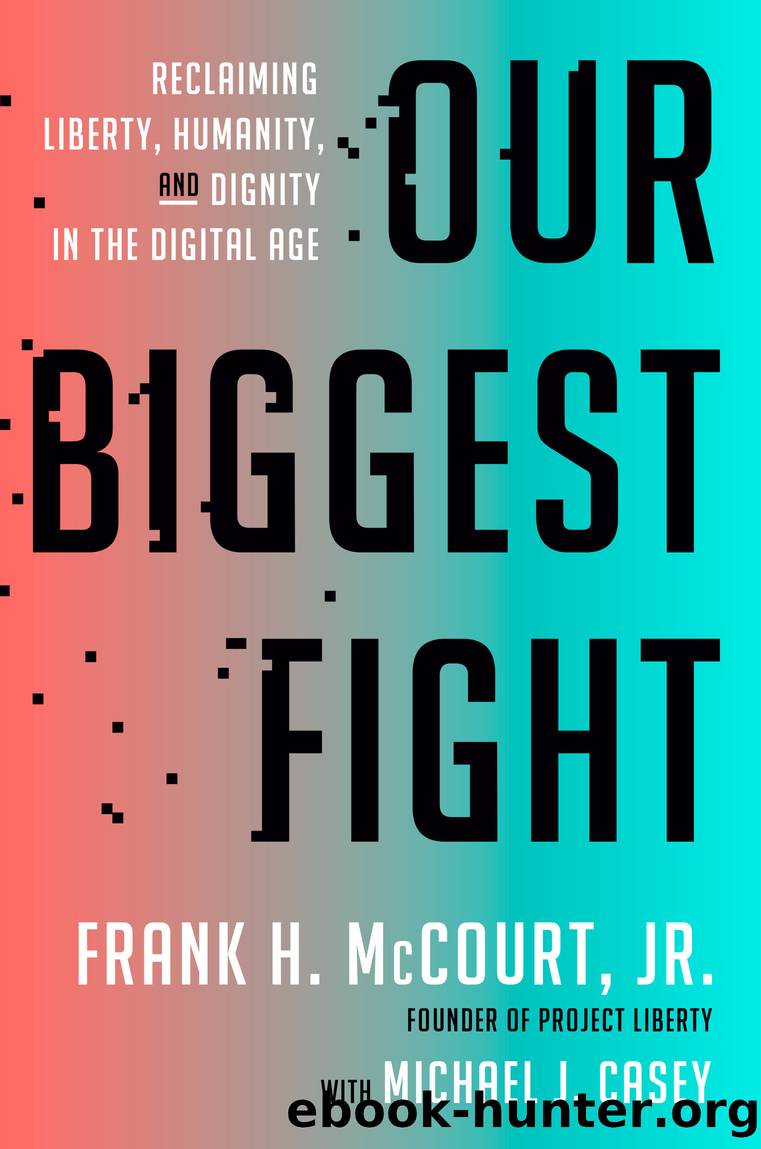Our Biggest Fight by Frank H. McCourt Jr

Author:Frank H. McCourt, Jr. [McCourt, Frank H.]
Language: eng
Format: epub
Publisher: Crown
Published: 2024-03-12T00:00:00+00:00
The Omnipresent Platforms
Big Tech is not the first industry in U.S. history to exploit a position of information dominance. In fact, the behavior of internet platforms as centralized data accumulators, aggregators, and distributors has parallels with Wall Street in the 1980s. Thatâs when Salomon Brothersâ swashbuckling traders, whose âgreed is goodâ ethos was captured in Michael Lewisâs 1989 book, Liarâs Poker, personified an era of excess and egotism that now seems quaint by comparison. Back then, before electronic trading blew the lid off their opaque pricing arrangements, Wall Streetâs bond brokers were in an unbeatable position. As intermediaries, they alone had visibility into what buyers and sellers were willing to pay or accept in the secondary market. No one knew the true market price of a bond, which meant the brokers could make a huge margin, or âspread,â between the prices they charged buyers and the prices they paid sellers.
As intermediaries presiding over the entirety of the worldâs human online data, all within an environment that no one else can see into, the internet platforms have vastly more power than bond brokers ever did.
Exhibit A: Google Ad Exchange (AdX). Googleâs programmatic advertising marketplace was at the time of writing embroiled in a lawsuit brought by the Department of Justice in January 2023 against Googleâs parent company, Alphabet, which it charged with monopolistic behavior in the ad market. This lawsuit should have happened decades ago. Itâs not just that AdX places more than 80 percent of the ads you see on websites and 40 percent of those on videos, itâs that Alphabetâs dominance of search, email, video hosting, GPS services, document sharing, and smartphone software has turned it into an omniscient being that can do as it pleases in a market that depends on it. Alphabetâs secretly protected mountain of data gives it insurmountable advantages in knowing where the audience for ads liesâwhere to find the attention that media outlets and other content providers seek to capture and deliver to their clients, the advertisers. Much like the bond investors of the 1980s, those buyers and sellers of ads have no one else to turn to but to the Alphabet intermediary for the vital information they need to reach their audience.
Alphabetâs black box dataset is central to every aspect of the online advertising industry. Since its information is impenetrable, there are huge blind spots in the media and marketing industryâs understanding of the economy in which they operate. This has spawned a global industry of fraudulent traffic data, in which supposed experts, activity-monitoring consultants, and data brokers peddle fallacious numbers to businesses. This messy, untrustworthy data is used to support everything from YouTube influencer fees to the rates that media websites charge for all those annoying banner ads we suffer through. Google has no real incentive to clean all this up. After all, for the past decade it has taken in an astounding one-third of all digital ad spending. When you add Meta to that, the combined share for the two companies is fully half of the market.
Download
This site does not store any files on its server. We only index and link to content provided by other sites. Please contact the content providers to delete copyright contents if any and email us, we'll remove relevant links or contents immediately.
Cecilia; Or, Memoirs of an Heiress — Volume 1 by Fanny Burney(31351)
Cecilia; Or, Memoirs of an Heiress — Volume 3 by Fanny Burney(30948)
Cecilia; Or, Memoirs of an Heiress — Volume 2 by Fanny Burney(30907)
The Great Music City by Andrea Baker(21571)
We're Going to Need More Wine by Gabrielle Union(18083)
Bombshells: Glamour Girls of a Lifetime by Sullivan Steve(13119)
Pimp by Iceberg Slim(12946)
All the Missing Girls by Megan Miranda(12774)
Fifty Shades Freed by E L James(12462)
Talking to Strangers by Malcolm Gladwell(11905)
Norse Mythology by Gaiman Neil(11901)
Crazy Rich Asians by Kevin Kwan(8369)
Mindhunter: Inside the FBI's Elite Serial Crime Unit by John E. Douglas & Mark Olshaker(7848)
The Lost Art of Listening by Michael P. Nichols(6481)
Enlightenment Now: The Case for Reason, Science, Humanism, and Progress by Steven Pinker(6414)
Bad Blood by John Carreyrou(5780)
The Four Agreements by Don Miguel Ruiz(5530)
Weapons of Math Destruction by Cathy O'Neil(5046)
We Need to Talk by Celeste Headlee(4879)
